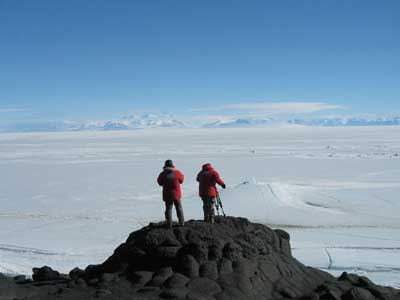June 23, 2008
The End of Silverdocs, the End of the World

I was on the programming committee for Silverdocs this year, which has made the question of blogging a bit confusing for me—how do you review an event that you had a hand in creating? My answer for now is to review just those films I hadn’t yet seen in the programming process, those I did not vote on.
One of which was Werner Herzog’s Encounters at the End of the World, in which the director continues on the path of the aging artist who no longer has patience for subtlety and now spells out his ideas for you in plain English. Or with a brick over the head. Back in 1971 Herzog made Land of Silence & Darkness, which is about people who are both deaf and blind, and I still think about the scene where the camera just sits, and sits, and watches a deaf-blind woman as she sits on her bed. The silence, to use a cliche AND pun, is deafening, as we watch her and ponder, where *is* she?
In some later films, as his patience wears thin, Herzog’s camera will linger on a person’s face, but in voiceover he’ll *tell* you what he thinks that person is thinking. And in Encounters at the End of the World, in which Herzog travels to Antarctica to photograph the breathtaking ‘ecstatic imagery’ of the landscape and interview its odd inhabitants, all tact is lost and he moves to damping down the sound while a subject is talking and coming on in voiceover to paraphrase and interpret what the subject is saying as he says it. At least he’s not hiding anymore the fact that he often invents scenarios in his “documentaries”; it’s almost as if he’s making a joke out of it. He does it twice in the film and the audience got a hearty laugh out of it. Much of the film is funny, in fact, which is another, more refreshing trait that has emerged in Herzog’s films as he ages. Most of his early films were deadly dramatic and bombastic, but he seems to have embraced the knowledge that enlightenment means lightening up (to quote that mad genius in his own mind, Mike Myers). In interviews he has always been hilarious while at the same time poetic and thought-provoking, and his films now embody that as well.
And nothing is funnier than the exchange in the film between Herzog and a scientist who studies and lives with penguins. “Can a penguin go crazy?” he asks the laconic man. And he clarifies, “I don’t mean that a penguin will suddenly think he’s Napoelon, but do penguins ever just get fed up with their colonies and leave?” And what follows is the most poignant sequence in the film, a film he vowed in voiceover would not be “another penguin film.” We watch a line of penguins waddling toward the sea in the distance, while one stops and seems confused for a moment, and then begins wandering off alone on a path toward the mountains, and as Herzog points out, toward certain death.
The parallel to humans is obvious, as Herzog has throughout the film (and indeed, throughout his career) been interrogating the various weirdos and “castoffs” who inhabit such an inhospitable place. And I think in his youth Herzog would have let that point make itself.
 Filed by cynthia rockwell at 7:21 am under Just Movies,Silverdocs
Filed by cynthia rockwell at 7:21 am under Just Movies,Silverdocs
 1 Comment
1 Comment
i just saw this film too. herzog is crazy and wonderful.